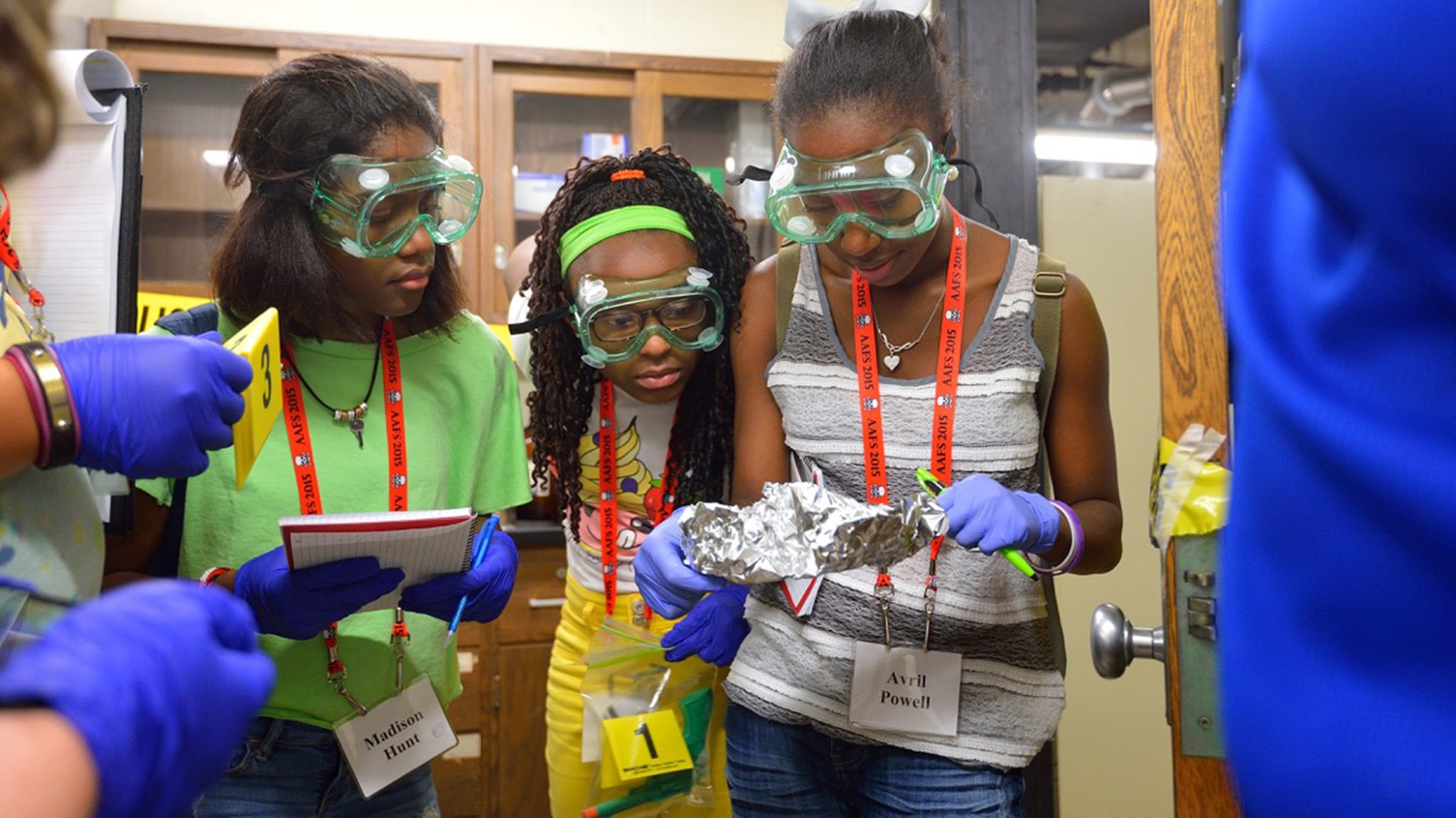
CSI Summer Camp participants look for potential evidence in a staged crime scene. Photo by Robert Jordan/Ole Miss Communications
OXFORD, Miss. – The crime scene was cordoned off. A methamphetamine lab operator there had been killed in an apparent botched robbery attempt. Samples were taken to be analyzed, which helped investigators identify a suspect. The situation played out like the plot in a TV crime drama.
But the blood wasn’t real – it was only barbecue sauce and ketchup – and the corpse was a CPR training dummy. The scenario was all part of a weeklong Crime Scene Investigation Camp and Forensic Teacher’s Conference. The event was hosted by the University of Mississippi Department of Chemistry and Biochemistry and its forensic chemistry program in cooperation with the American Academy of Forensic Sciences, or AAFS, and the UM Division of Outreach and Continuing Education.
“By the time the students leave here, they have a good idea of what it’s like to be a forensics expert,” said Murrell Godfrey, associate professor of chemistry and director of the program. “They also understand that ‘CSI’ (the TV show) isn’t real. There’s a lot more that goes into it. You can’t just solve a crime in one hour.”
UM has one of three forensic chemistry programs in the nation that is accredited through the AAFS. The camp put 32 students from across the country and 10 teachers on the case. At UM July 19-24, they participated in crime scene processing, ballistics, gunshot residue testing, DNA and fingerprint lab analysis and other criminal investigation techniques. They also had all the high-tech tools of the trade at their disposal.
“Students get to use equipment and technology that they normally wouldn’t have access to,” Godfrey said.
Students learned about proper chain of custody procedures and the paperwork associated with evidence in a criminal case. They also worked with instructors from the U.S. Drug Enforcement Agency and even had to testify in a mock trial at UM’s School of Law to present their evidence before a jury. Tucker Carrington, director of the Mississippi Innocence Project based at UM, talked to the students about his group’s efforts to use DNA testing to free people who were wrongfully convicted.
Caroline Spencer, a UM doctoral student in chemistry and graduate teaching assistant, helped with the camp. She gave students instructions on the DNA lab work they were doing Monday, which involved using a sophisticated method known as gel electrophoresis to analyze DNA. The method uses an electrical current to separate macromolecules such as DNA, RNA and proteins to be analyzed. Spencer said the camp offers students an opportunity she wishes she’d had at their age.
“They did great,” Spencer said. “They’re learning a lot of techniques that you don’t learn until the college level, like pipetting with gel electrophoresis. I didn’t learn that until my sophomore year of college. They’re getting a really early start with that and they’ll be way ahead of their peers.”
Camp instructors also drive home the importance of studying science, math, engineering and technology.
“The goal here is to show students that you need a strong foundation in science, math, engineering and technology education to go into forensic science or forensic chemistry,” Godfrey said.
Hunter Crane, a seventh-grade science teacher at Oxford Middle School, led a session on ballistics, mainly the different types of bullets and how various guns leave different marks on bullets as they leave the barrel. Crane also helped students perform gunshot residue tests on the hypothetical suspect. Those tests help police determine whether a suspect has fired a gun recently.
Crane said the opportunity to use the camp and the popularity of “CSI” to get the students more interested in STEM fields is incredibly valuable.
“It’s just a great opportunity,” Crane said. “There was already an interest with the ‘CSI’ TV show. But just from what I’ve been involved with, I know the TV show isn’t actually what CSI is. The interest is there and being able to get them involved with the camp here at Ole Miss is a step in the right direction. Science is an important subject that they need.”